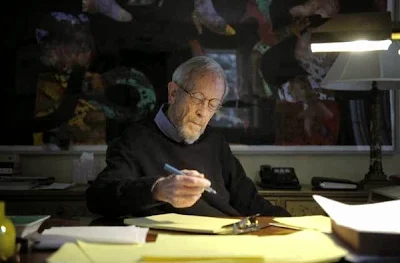 |
| European Parliament building in Strasbourg, France via Flicker |
Here in the U.S. when we wring our hands about our rabid right wing, its racism, violent rhetoric and embrace of ignorance, we tend to see it as a local aberration, a national failing.
But it's not entirely limited to the U.S. Thanks to the Mayor of Toronto, we're more cognizant of a Tea Party rightist trend in Canada, which has affected national as well as local politics and policy.
Now an oped in the New York Times asserts a widening of something similar in Europe, and not simply within countries. It is deliberately attacking the European Union, so it is happening to Europe.
Andrea Mammone writes:
It may seem bizarre that two far-right, nationalist politicians — Marine Le Pen of France and Geert Wilders of the Netherlands — have reached across borders to form a Pan-European group dedicated to weakening the European Union. Their aim is a transnational political alliance that would compete in the May elections for the European Parliament; once in power, they would cooperate to try to rein in the power of Brussels.
While the Tea Party in Canada may be partly an American import, Mammone traces the history of the European model: "But in fact, since the early 20th century, Europe’s far-right nationalists have often united in search of an “other” to oppose, exclude, resist, restrict or oppress... "
The most extreme and famous example is the Nazis.
This vision did not die with the end of World War II. Transnational links among right-wing parties, based on common fears of minorities and immigrants, endured. The right-wingers, while speaking different languages, borrowed ideals, strategies, slogans and theorists from one another...
So when observers marvel about the “new” nationalist parties of Europe, they are capturing only part of the truth. These right-wingers mistrust or even detest the Continent’s core institutions — the European Commission, the European Central Bank and the European Parliament — but they are perfectly happy to join up with extremists in other countries to weaken those institutions.
Anti-immigrant racism and a deathly hostility to government characterize European as well as North American far rightists. They seize upon economic troubles:
Soaring youth unemployment, stringent fiscal policies, German-led monetary clout and the presence of Muslim immigrants have created a perfect target for the likes of Mr. Wilders and Ms. Le Pen, who blame outside forces like the International Monetary Fund, the European Central Bank and the European Union for their nations’ woes. Conveniently, they overlook structural problems like the costs of social welfare and pension programs, declining birthrates, aging populations, stagnant labor productivity and intensifying competition from the economies of Asia and Latin America.
But Mammone also suggests that bureaucratic remoteness has left the European Union open to such attacks. These parties may gain enough votes in coming elections to cause trouble. "Even as a tiny, noisy voice within the European Parliament, this alliance could create a lot of trouble. Just think of the successes that Tea Party Republicans have had in impeding decision making in the United States."
How would these right-wingers reshape Europe? They say they would give power back to nations by dismantling the technocratic decision-making power amassed in Brussels and returning powers back to individual member states. They would pause, if not quite reverse, six decades of growing integration.
Two elements in this analysis seem especially appropriate to a more cogent analysis of what's going on in the U.S. First is relating it directly to movements in the American past. Some efforts have been made but none seem as effective as the vigorous pushback in the 1960s to the extreme right surge during the administration of the first U.S. President to be of the alien Catholic faith (while today's rightists include many Catholics). Richard Hofstader's Anti-Intellectualism in American Life comes to mind, a history of ignorance-proud extremism, and a best-seller in the early 60s.
The second is related: the inability of defenders of government and liberal democracy to respond to the challenge. President Obama has been eloquent in his redefinition of this political ethic, and while the media establishment etc. ignores him (and even liberals criticize him for not saying what in fact he is saying.) In policy and political terms, there are some political signs: the elections of progressive populists Senator Elizabeth Warren and Mayor of NYC de Blasio. The rabid right as a more extreme version of the policies born in a new flurry of right wing think tanks a few decades ago suggests that new progressive organizations, notably the Center for American Progress, may be crucial in creating more momentum . But at the moment, the progressive defense seems insufficient.
Here's Mammone's conclusion about Europe:
Tragically, in the face of this assault, calls for European solidarity are few. This is a sign of how far Europe has come from the dream that helped lift it from the ashes of war. It is a sign of the fading of the vision — common markets, democratic institutions and societal integration — promoted by the postwar founders of European integration: thinkers and statesmen like Konrad Adenauer, Winston Churchill, Jean Monnet, Robert Schuman and Altiero Spinelli.
The European Union must reclaim its reputation as a champion of the people. Its leaders should abandon their embrace of technocratic solutions, their support for the banking sector and their stoic austerity. Unless they deliver more jobs, and more of a sense that citizens are in charge, the far right will only keep growing."
It's about more than Europe. It's global economic policy that favors the wealthy, that sets the rest against each other for the crumbs, gets the majority poor to hate the minorities and vote against those who might use government to constrain the rich and enforce economic justice. That's the common thread, isn't it? Encouraged by needless austerity, racial flashpoints, and a comfortably complacent or otherwise helpless governing class.


































